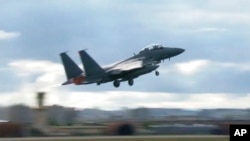The U.S. show of force over the Korean peninsula Saturday, when two B-1B stealth bomber aircraft flew over the peninsula for the first time since 2017, was just part of a major joint exercise meant to ensure the United States has a "ready force" in the region, according to the U.S. Air Force chief of staff.
"It was all part of the Vigilant Storm exercise, an exercise that we've operated under over time," General C.Q. Brown Jr. told VOA in an exclusive interview Monday.
"This is another one of the exercises that we've done, and we'll continue to do, to ensure that readiness. We have an ironclad alliance with the Republic of Korea, and it's all just part of an exercise and our continued training," he added.
Prior to the flight of the B-1B bombers, which U.S. officials told VOA came from Guam, North Korea fired four short-range ballistic missiles off its west coast on Saturday morning.
North Korea said Monday that its recent missile launches over the past few days were simulated strikes on South Korea and the United States as the two countries held what it called a "dangerous war drill."
Some 240 aircraft participated in last week's joint U.S.-South Korea exercise on the peninsula, Vigilant Storm, along with thousands of U.S. and South Korean troops.
North Korea fired a daily record of 23 missiles on Wednesday, with one landing the closest to South Korea's territorial waters since the division of the Korean peninsula in 1945, according to South Korea. Air raid alarms in certain parts of South Korea and Japan sent citizens rushing to take cover after the North Korean missiles launches.
On Thursday, Pyongyang's missile launches included an intercontinental ballistic missile (ICBM), a weapon designed to carry a nuclear warhead as far as North America.
Brown called Pyongyang's recent aggressive behavior part of the "ups and downs" of missile activity from North Korea, adding that his "real focus" is on the readiness of the U.S. and South Korean forces.
Brown served two tours on the Korean peninsula and was the commander of Pacific Air Forces before assuming his role as Air Force Chief of Staff in August 2020.
After North Korea's ICBM launch on Thursday, the U.S. and South Korea extended Vigilant Storm, which was set to end Friday, for an additional day.
David Maxwell, an Army veteran who was stationed in Japan and South Korea and an analyst with the Foundation for Defense of Democracies, told VOA the allied response to North Korea's recent aggression was "better than it has been certainly in the last five years."
"I think both the Yoon and Biden administrations are recovering from decisions made in the last administration to reduce training, as well as the effects of COVID," Maxwell said.
But the U.S.-ROK military actions did not stop South Korean press from questioning U.S. Secretary of Defense Lloyd Austin and South Korean Minister of National Defense Lee Jong-sup on the "effectiveness" of U.S. and South Korean deterrence measures last week, to which Austin replied that he believed North Korea was deterred from attacking South Korea and also from deploying a nuclear device.
According to Maxwell, North Korean leader Kim Jong Un's recent missile launches are an effort to "drive a wedge in the ROK-U.S. alliance" to create dissension among politicians.
"He (Kim) is trying to weaken military readiness. He is appealing to those naive pundits who think that if we just cancel exercises that he will come to the negotiating table and act like a responsible member of the international community. Nothing could be more wrong," Maxwell said.






